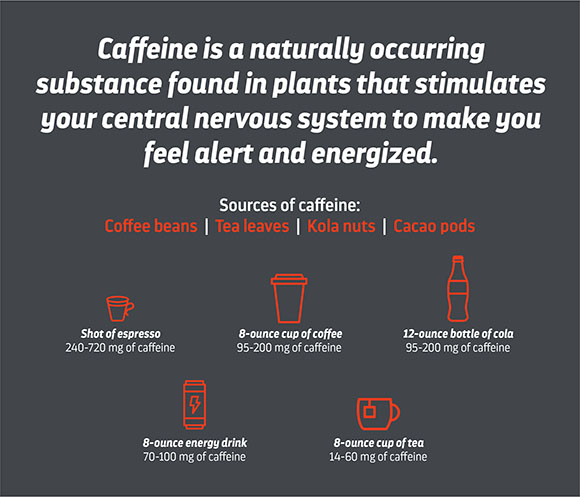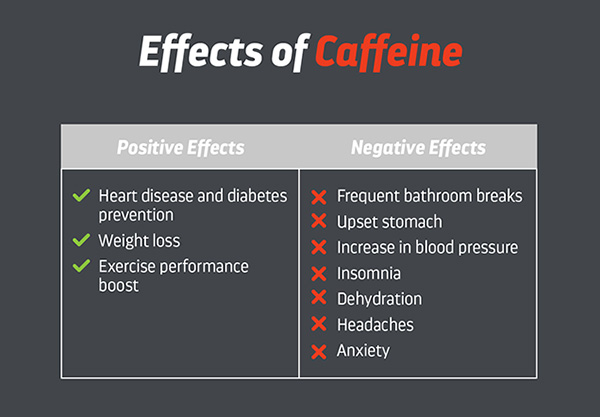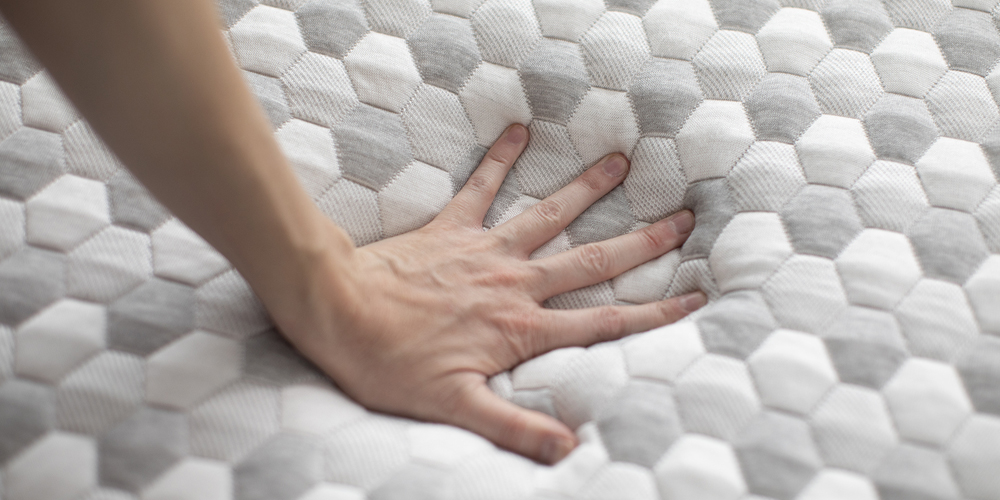You’ve probably heard of caffeine, which is a natural substance extracted from plants, most notably the coffee bean. And because caffeine is typically consumed to help wake us up, it can lead to restless nights and a lack of sleep. Before you reach for that second (or third) cup of coffee to get you through the afternoon crash, it’s important to know how coffee affects sleep. Throughout this post, we’ll cover all there is to know about coffee and sleep. To learn more, keep reading. Or, use the links below to navigate the post to find an answer you’re looking for.
- What Is Caffeine?
- Effects of Caffeine
- How Long Does Caffeine Last?
- How Does Caffeine Affect Sleep?
- Other Ways to Improve Sleep
- Wrapping Up: Caffeine and Sleep

What Is Caffeine?
Caffeine is a naturally occurring substance found in plants. Some of the most common sources of caffeine include:
- Coffee beans
- Tea leaves
- Kola nuts
- Cacao pods
Scientists can also make caffeine in a lab. Synthetic caffeine is typically used for pharmaceutical purposes in medicine, such as pain relievers, or in foods and drinks like energy drinks. When caffeine is consumed, it stimulates your body’s central nervous system, making you feel more awake and energized. Caffeine is typically consumed through beverages like coffee, tea, and energy drinks.
Caffeine levels can vary, but some average caffeine levels for popular drinks go as follows:
- A shot of espresso has about 240-720 mg of caffeine
- An 8-ounce cup of coffee has about 95-200 mg of caffeine
- A 12-ounce bottle of cola has about 35-45 mg of caffeine
- An 8-ounce energy drink has about 70-100 mg of caffeine
- An 8-ounce cup of tea has about 14-60 mg of caffeine

Effects of Caffeine
Caffeine has various effects on your body, which can be both good and bad. As a stimulant, caffeine targets your central nervous system, making you feel awake and ready to tackle the day. This is why most Americans reach for a cup of coffee first thing in the morning. However, giving you energy isn’t the only positive effect of caffeine. Some benefits of caffeine include:
- Heart disease and diabetes prevention: Studies have found that caffeine consumers drinking between 1-4 cups of coffee a day have a 16-18% lower chance of suffering from heart disease. Researchers also found that drinking coffee can result in a 29% reduced chance of developing type 2 diabetes.
- Weight loss: Because caffeine targets the central nervous system, it can help speed up your metabolism by up to 11% and burn fat by up to 13%. Additionally, consuming 300 mg of caffeine a day can help you burn an additional 79 calories per day.
- Exercise performance boost: For those who exercise, consuming caffeine can give you a much-needed performance boost. Research shows that consuming 2.3 mg of caffeine for every 5 lbs of body weight can improve endurance performance by up to 5% when consumed 1 hour before activity.
Caffeine isn’t all rainbows and butterflies, however. Consuming caffeine can result in some negative side effects. Fortunately, most of these side effects are relatively mild. Side effects might include:
- Frequent bathroom breaks: As a diuretic, caffeine helps your body get rid of salt and water by causing more frequent urination.
- Upset stomach: Caffeine can increase the amount of acid released into your stomach, which can result in heartburn or an upset stomach.
- Increase in blood pressure: Caffeine can make your blood pressure rise by causing your adrenal glands to release adrenaline into your body.
- Insomnia: Caffeine suppresses melatonin, which is the chemical in your body that regulates your natural sleep-wake cycle.
- Dehydration: Because caffeine is a diuretic and causes you to go to the bathroom more often, you can become dehydrated. Caffeine doesn’t directly cause dehydration, but it can affect your hydration levels, which is why it’s important to drink water throughout the day.
- Headaches: When you consume caffeine, the blood vessels around your brain shrink. As caffeine slowly exits your body throughout the day, these blood vessels begin to open up, increasing blood flow and pressure around the brain, which can cause headaches.
- Anxiety: As a stimulant, caffeine activates your body’s fight or flight response, which can make you feel jittery and restless. These feelings can result in anxiety attacks or make your anxiety worse.
There are numerous pros and cons to consuming foods and beverages with caffeine. Fortunately, caffeine is safe to consume. The U.S. Food and Drug Administration cites that 400 mg of caffeine, roughly 4 to 5 cups of coffee, is safe to consume without any severe side effects. However, it’s important to remember that every person has different sensitivity levels and how fast their body can metabolize caffeine. So it’s important to know how much you can tolerate.

How Long Does Caffeine Last?
According to the Journal of Clinical Sleep Medicine, the effects of caffeine can last up to six hours after consumption. Caffeine is measured by its half-life, which is how long it takes for the caffeine in your body to be reduced in half. The half-life of caffeine typically ranges between 4 and 6 hours, which means consuming caffeine at night can keep you up well past your bedtime.
Various factors can affect the metabolism of caffeine. For example, those who consume nicotine, process caffeine much quicker. This is because nicotine can reduce the half-life of caffeine by up to 50%. This means some avid smokers can process caffeine in as short as two hours. On the other end of the spectrum, pregnant women process caffeine much slower. That’s why excerpts suggest that pregnant or breastfeeding women reduce the amount of caffeine they consume a day, ideally 16-ounces of coffee or less.
How Does Caffeine Affect Sleep?
Caffeinated beverages are typically consumed in the morning for a reason. They help give your body a boost of energy to wake up and get your day going. This means caffeine and sleep aren’t a good duo. Consuming caffeine close to bedtime can result in sleep loss and the inability to fall asleep. Studies have found that even consuming caffeine six hours before bedtime can result in an hour reduction in sleep. The same study also found that those who consumed caffeine three hours and zero hours before going to sleep also had sleeping problems.
It’s important to remember that caffeine isn’t a remedy for sleep deprivation. While it provides an energy boost and can help keep you awake, the feeling is only temporary. Using caffeine to stay awake can lead to further restlessness and insomnia at night, making your sleep deprivation worse. Caffeine’s effects on sleep can result in anxiety, frequent awakenings throughout the night, and poor sleep quality. The Sleep Foundation also states that caffeine reduces the time of slow-wave sleep, which is the deep sleep you get that promotes muscle repair, alertness, and the refreshed feeling in the morning. Finding ways to improve your sleep is a much better solution to feeling awake than depending on your morning cup of java.

Other Ways to Improve Sleep
Aside from reducing the amount of caffeine you consume to help improve sleep, there are plenty of other solutions. Some ways to improve sleep include:
- Hydration: Hydration affects many systems in your body, including how well you sleep. Studies have found that lack of sleep can disrupt hydration levels, and dehydration can disrupt sleep. Drinking water throughout the day can help ensure a restful sleep. Just make sure you don’t go overboard drinking water before bed, as you’ll likely have frequent bathroom breaks throughout the night disrupting your sleep cycles.
- Better bedding: The surface you sleep on plays an integral role in how well you sleep at night. If you’re tossing and turning because your bed is uncomfortable or squeaky, it’s time to make a change. Layla Sleep’s memory foam mattresses and hybrid mattresses are constructed with copper-infused memory foam to alleviate aches and pains and keep you comfortable all night long. You can even outfit your bed with cooling bamboo sheets to keep you refreshed throughout the night.
- Exercise: If you’re having difficulty staying asleep, exercising during the day can help you. When you exercise, you will tire your body out, which can help you get deep sleep at night. Just make sure to exercise more than three hours before bedtime, as exercising too close to sleep can leave you restless and awake.
- Reduce light exposure: Natural sunlight dictates your body’s internal clock, which regulates your sleep-wake cycle. However, in the modern age we live in, we’re exposed to light well after the sun goes down. Reducing blue light exposure from TVs, computers, cell phones, and other electronic devices can help your circadian rhythm stay on track and help you fall asleep and stay asleep.
These are just some of the ways you can improve deep sleep. Organizations like the CDC, National Institutes of Health, and National Institute on Aging go over the importance of good sleep and how you can get some quality shuteye every night.
Wrapping Up: Caffeine and Sleep
Now that you know how coffee affects sleep, you might need to make a few lifestyle changes. This doesn’t mean you need to ditch caffeine altogether. It just means you should probably avoid a late afternoon coffee run to get you through the last few hours of work. While caffeine and sleep don’t go hand in hand, caffeine does have some beneficial advantages. As long as you consume your caffeine in the morning and improve your sleep hygiene, you’ll be able to enjoy your cup of Joe and get a good night’s rest.



